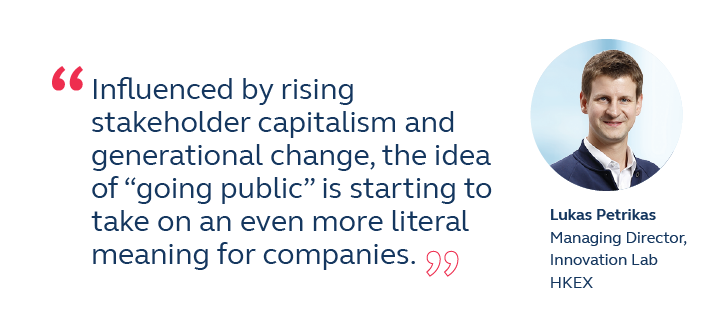By Lukas Petrikas, Managing Director, Innovation Lab, HKEX
Influenced by rising stakeholder capitalism and generational change, the idea of “going public” is starting to take on an even more literal meaning for companies. This raises intriguing possibilities for the traditional economic role of a stock market.
As home to one of the world’s most popular financial markets for Initial Public Offerings (IPOs), Hong Kong knows all about the optimism and aspirations associated with big stock market listings. We’ve seen the excitement of company founders, the eagerness of new investors and the smiles of those who get to ring that famous gong.
We mark 20 years since Hong Kong Exchanges and Clearing Limited (HKEX) was listed on its own market, and it’s given us an opportunity to look back at how listings have changed.
While we still call it “going public”, the term may feel outdated when set against the complexities of modern financial markets with their algorithmic trading, global institutional shareholders and intermediated transactions. Relationships between listed companies and individual investors have, with time and technology, often become more distant and abstract.

The current pandemic reminds us that relationships between company and investor, and corporate and consumer, still matter. It has shone a spotlight on some of the little-known companies that play important and often invisible roles in society. We eat the food they produce and package. We wear the clothes they design and manufacture. We live in the spaces they engineer and construct. We entrust our money to them, and our mobile devices carry the apps they build. Sometimes, their inventions can save our lives.
Closer connections with the public
There has been a notable surge in retail trading account openings during the recent social lockdowns, both in Hong Kong and globally. Investors are discovering more than 2,400 Hong Kong-listed companies, many for the first time. In this digital age of fast information looking beyond brand names and deeper into each underlying business has never been easier.
Two longer-term trends suggest that this renewal of engagement between companies and individual investors is here to stay.
The first is the rise of stakeholder capitalism. Prominent companies and executives are role models, increasingly evaluated on their commitments to good governance, equality, environmental and social impact. Stock markets can be effective mechanisms to both encourage and reward good behaviour. We are committed to playing our part in this movement, both as a company ourselves, and by setting progressive environmental, social and governance (ESG) standards for companies listed on our markets.
The second is generational change. Millennials and Gen Z shoppers are shaping consumer demand and corporate fortunes with their passions and priorities. Crowdfunding and token-based issuance have shown us that converting customers into investors is not only financially viable, but may even be preferable to traditional forms of capital raising. This new kind of loyalty between companies and individuals is meaningful for the future of financial markets.
Shares in the Future
While there are many reasons to list your shares on a stock exchange, the primary ones have always been to raise capital, provide liquidity to shareholders, and elevate brand value to attract customers and talent.
The shares themselves are usually an afterthought. Once dusty certificates on the wall, today shares are simply database entries in windowless data centres, a format that optimises for liquidity and reduces logistical hassle. It’s tempting to see this as a kind of technological apogee, but that would be to diminish the role of equity as an enduring economic concept, an asset class whose form can evolve and improve with the needs and technologies of each era.
In a stakeholder-centric future, the humble share may yet come to re-invent itself once again, perhaps in unexpected ways. Some companies may begin to see their shares as potent digital assets capable of engaging even more directly with their investors and customers.
Shares in an entertainment company could serve as an entry pass to a theme park or an event. Shares in a sports apparel maker could pay you a small dividend for every 10 kilometres you run in their shoes. Owning shares in a solar company could trigger a discount on your monthly electricity bill. A unit of ownership that is both uniquely identifiable and digitally portable could take on new significance and societal value in the hands of imaginative executives.
Electronic and digital assets of all kinds, such as loyalty programme points, are already finding a place inside mobile e-wallets alongside traditional currencies and securities. This kind of convergence between the dematerialised and material economies is by no means a foregone outcome, but the opportunities it could open for capital markets are nonetheless formidable.
Hong Kong’s Role
Hong Kong’s markets welcomed IPOs worth HK$2.4 trillion in the ten years to 2019, finishing the decade as the world’s largest listing venue by proceeds. The IPO market is a hallmark of our city’s status as a premier international financial centre, and we care deeply about its future.
Working with the industry, HKEX has enhanced its listing rules to make our markets more attractive to new economy companies, and has been working with listed companies to emphasise the importance of the role they play in connection with all their stakeholders. Plans are also in progress on new ways to allow billions of shares to move through our systems with more speed, efficiency and adaptability.
We are all entering an uncertain new normal in the wake of COVID-19. Whatever the future brings for public companies, we want to make that journey as productive for others as it has been for us. With Hong Kong’s history of resilience, reinvention and innovation, we should all be looking forward with optimism.
Credit: This article first appeared in ejinsight on 15 June,2020